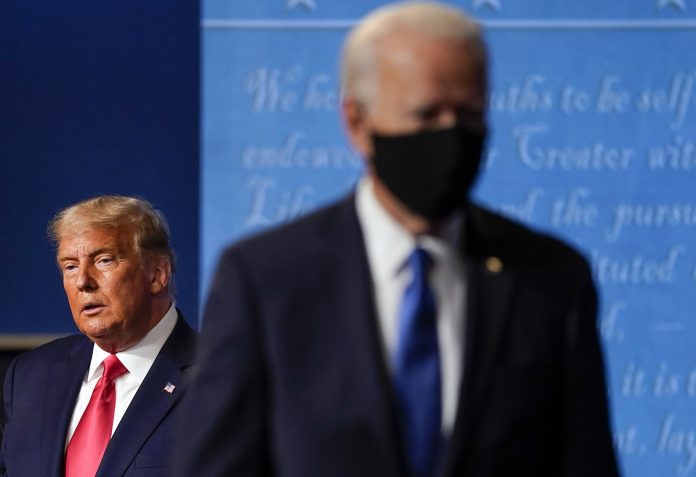
A lawsuit before the U.S. Supreme Court seeking to subvert the will of the voters who elected Joe Biden president over Donald Trump makes a barrage of claims that don’t hold up under basic scrutiny, no matter how relentlessly Trump and his allies promote the case and push state lawmakers to support it.
The complaint was filed earlier this week by Texas Attorney General Ken Paxton and directly attacks four other states that President-elect Joe Biden won: Georgia, Michigan, Pennsylvania, and Wisconsin. Legal experts widely expect the lawsuit to fail, yet 126 Republican members of Congress— including House Republican leader Kevin McCarthy — and 17 Republican attorneys general have signed on to the case in a show of support.
Together, Trump and his allies argue that the high court should set aside all four states’ votes, allowing Republican-led state legislatures to swing the election to the president. That would be something that has never occurred in U.S. history.
Michigan Attorney General Dana Nessel said Friday that if Texas wins, “It is the end of democracy in the United States of America, and that is not hyperbole. It’s just a fact.”
Here is a look at some of the claims made in the lawsuit and how those claims have been debunked.
___
THE LAWSUIT CLAIMS: The four states that Texas is suing “usurped their legislatures’ authority and unconstitutionally revised their state’s election statutes.”
THE FACTS: Trump and his allies have lost many cases making the argument that only state legislatures could modify election practices during the coronavirus pandemic. This lawsuit rehashes arguments already rejected by courts siding with officials who acted under their respective state laws.
For example, the lawsuit alleges that Pennsylvania “unconstitutionally did away” with “statutory signature verification requirements.” But the Pennsylvania Supreme Court unanimously ruled in October that state law makes it clear only that the ballot envelope requires the voter’s signature, but not a matching signature.
Among the states that changed voting practices without legislative action this year is Texas, which extended early voting by six days due to the pandemic.
___
THE LAWSUIT CLAIMS: Given Trump’s lead in the four states “as of 3 a.m.” the morning after the election, Biden’s chances of winning all four was “less than one in a quadrillion.”
THE FACTS: What sounds like a statistically significant figure isn’t grounded in what experts before the election predicted: In-person votes counted more quickly would likely favor Trump and mail-in votes counted later would favor Biden.
Democrats for months pushed voters to submit mail-in ballots that would be counted later, while Trump attacked mail-in voting as fraudulent even though he voted by mail in Florida. Republican legislative leaders in Michigan, Pennsylvania, and Wisconsin all resisted pleas from election officials to update the laws to allow for a speedier count.
The idea that Trump would have large initial leads came as no surprise and does not prove any malfeasance or fraud happened.
___
THE LAWSUIT CLAIMS: There are “facts for which no independently verified reasonable explanation yet exists.”
THE FACTS: Each of the listed “facts” has an independently verified explanation.
A laptop and thumb drives were stolen on Oct. 1 from a city warehouse in Philadelphia. A spokesman for the city elections commission said then, “We are confident that this incident will not in any way compromise the integrity of the election.” The local district attorney said days later that police found the theft was unrelated to the election, according to the Philadelphia Inquirer.
There was briefly a tabulation problem that involved a few thousand votes in Republican-leaning Antrim County, Michigan. But it wasn’t caused by voting machines. “There was no malice, no fraud here, just human error,” County Clerk Sheryl Guy said.
And Milwaukee’s chief elections official, Claire Woodall-Vogg, did leave behind one flash drive with absentee vote tallies when she was delivering a batch of flash drives to the local elections commission, according to the Wisconsin State Journal. Woodall-Vogg said she called a team member and a police officer delivered the last drive. Despite what the lawsuit says, Woodall-Vogg said the drive was “never left unattended.”
___
THE LAWSUIT CLAIMS: Texas has a right “to demand that all other States abide by the constitutionally set rules in appointing presidential electors to the electoral college.” It says other states are harmed when one state “violates federal law to affect the outcome of a presidential election.”
THE FACTS: Legal experts say Texas has no right to bring the case in the first place because it doesn’t get a say in how other states run their elections and has not suffered any real harm. And even if it did have a legitimate case, it was brought too late, experts say.
“Texas does not have standing in federal court to vindicate the voting rights of other states’ voters — much less standing to undercut the rights of those voters,” Lisa Marshall Manheim, a professor at the University of Washington Law School, wrote in an opinion piece for The Washington Post.
Some Texas Republicans agree. U.S. Rep. Chip Roy tweeted he would not join the case because “I believe the case itself represents a dangerous violation of federalism & sets a precedent to have one state asking federal courts to police the voting procedures of other states.”

